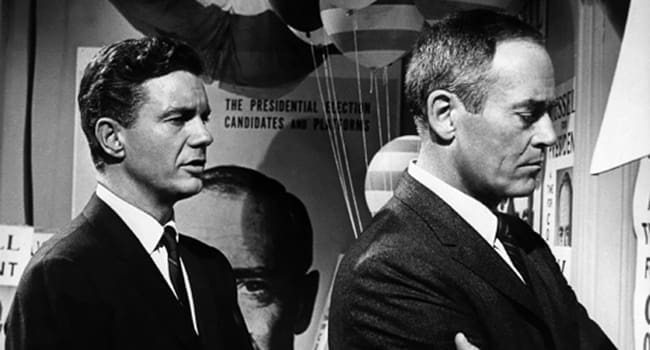 If you’re suffering withdrawal pangs from the wind down of the American election, here are three political dramas to assist your transition. Think of them as a form of therapy, a way of easing back to everyday life while still experiencing the atmospherics of the political arena.
If you’re suffering withdrawal pangs from the wind down of the American election, here are three political dramas to assist your transition. Think of them as a form of therapy, a way of easing back to everyday life while still experiencing the atmospherics of the political arena.
Subject matter aside, the films have two things in common. They’re mid-20th century in ambience and they’re adaptations from literary sources, two from novels and one from a play.
The Last Hurrah (1958)
Directed by John Ford and starring Spencer Tracy, this movie is based on Edwin O’Connor’s 1956 novel. O’Connor was an Irish-American and The Last Hurrah – his second novel – was both a major bestseller and a critical success.
The story’s protagonist, Frank Skeffington, is an old-fashioned Irish-American urban politician. He does things the traditional way.
Building a political machine, he delivers jobs, patronage and favours in return for votes. Inevitably, a whiff of graft and corruption is associated with this modus operandi.
And Skeffington has enemies.
The old Anglo-Saxon Protestant elite despise him as the grubby tribune of the Irish Catholics who’ve usurped political power. And the respectable rising Catholic class – including the cardinal – find him embarrassing.
The narrative focuses on an election campaign. Skeffington’s opponent – backed by his enemies – is also an Irish-American Catholic, albeit one who’s younger, a war hero and telegenic.
To his surprise, Skeffington loses. Then he suffers a heart attack and dies, but not before defying the enemies gathered around his bedside in the hope of witnessing repentance. There’s no pat redemption here.
Although O’Connor denied it, it’s generally accepted that Skeffington is a stand-in for James Michael Curley, an Irish-American Democrat who served four terms as mayor of Boston, one term as governor of Massachusetts and two terms in the U.S. Congress. He also did a couple of prison stints for fraud.
Along with being an interesting story, The Last Hurrah illuminates two things about mid-20th century American political life.
One is the rising importance of television in reaching voters. The other is the political evolution of Irish-American Catholics as they shift their preference from traditional boss figures to smoother operators.
Advise and Consent (1962)
The movie adapts Allen Drury’s enormously successful 1959 Pulitzer Prize-winning novel. Decades on, it’s still described as “the last great novel set in Washington.”
The story concerns a nomination for secretary of state. The nominee – Robert Leffingwell, played by Henry Fonda – is a liberal with past communist associations, which he denies under oath. Ultimately, but only after various machinations and skulduggery, his nomination fails.
In the process, the young senator chairing the subcommittee evaluating the nominee is blackmailed by one of Leffingwell’s supporters. The threat is to reveal a wartime homosexual relationship and the despairing senator commits suicide.
Drury, who’d spent a couple of years as senate correspondent for United Press, went on record to the effect that while people in the book might be akin to real people, they weren’t actually those people.
Nonetheless, a cottage industry sprang up putting real names to characters. Leffingwell, for instance, was deemed to be based on Alger Hiss, the State Department official who turned out to be a Soviet spy.
The Best Man (1964)
Fonda returns as the star of The Best Man, based on Gore Vidal’s 1960 play of the same name. This time, the action revolves around a presidential nomination contest.
Fonda plays the flawed liberal champion, William Russell. His major rival, Joe Cantwell, is an unscrupulous, opportunistic senator who’ll do anything to win. Fundamentally moral in a seamy business, Russell ultimately preserves his integrity at the expense of his ambitions.
It’s generally agreed that Russell is based on Adlai Stevenson, the Democrat who lost presidential elections to Dwight Eisenhower in 1952 and 1956, but still retained liberal affections coming into the 1960 cycle. The play opened shortly before that year’s Democratic convention.
Cantwell, meanwhile, is thought to be an amalgam of several people, including John F. Kennedy and Richard Nixon. And his ruthless campaign manager brother is reputedly Bobby Kennedy.
Vidal knew the Kennedys and wasn’t a fan of their politics, which he thought centred on power and family. He did, though, find J.F.K. immensely charming on a personal level.
So there you have it. Three political dramas that’ll help ease your withdrawal pains.
Pat Murphy casts a history buff’s eye at the goings-on in our world. Never cynical – well perhaps a little bit.
For interview requests, click here. You must be a Troy Media Marketplace media subscriber to access our Sourcebook.
The views, opinions and positions expressed by columnists and contributors are the author’s alone. They do not inherently or expressly reflect the views, opinions and/or positions of our publication.


